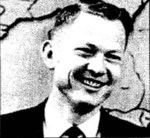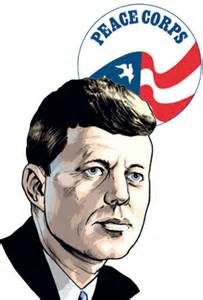Making Lemonade In The Maiatico Building, Part 7
What continues to surprise me is how few people–since that morning in the Mayflower Hotel–have read “A Towering Task” the policy paper written by Wiggins and Josephson. The document was the first draft of defining the Peace Corps; it was in some ways the Holy Grail of the agency. When I asked Warren Wiggins about this, he commented wryly, “It’s marvelous that nobody has read it because, you see, in most ways I didn’t know what the hell I was talking about. In some ways I was dead on, but I did recommend that we ship air-conditioned trailers to the Philippines to house the Volunteers. It’s a far cry from the theology of the Peace Corps that evolved, but then, those were the early days.”
What is clear now from the safety of time and distance is that being anti-establishment, amateurish, anti-professional was the reason for the success of the Peace Corps. This attitude permeated the whole organization and PCVs overseas expressed the same sort of sentiments, especially to the official U.S. government, all those “stuff shirt diplomats.” PCVs were all anti-establishment. That was our charm and also, admittedly, the reason for many of our failings.
Also, and this is important, the Mayflower Gang was driven by values, and those values, as expressed by Wiggins, were central to the ‘idea’ of what it meant to be a Peace Corps Volunteer.
The values were simple: The Volunteers would live the life of the villager, wear the same kind of clothes, eat the same food, live in the same kind of house. In a religious sense, they were taking a vow of poverty. To Americans, in the early ’60s, it appeared that PCVs were living in poverty. “We raised that to an ideal,” said Wiggins.”The vow of poverty was raised to an ideal. And that turned out to be an enormous strength for the Peace Corps.”
The Peace Corps stripped away the cultural and environmental support a Volunteer had grown up with: family, school, peer groups, rewards and success. The PCV was transplanted overseas with poverty as a value. The Volunteer went alone. They went to a strange land, without the supports and material blessings that had accompanied them all of their lives. And that then produced introspective changes.
This new life as a Peace Corps Volunteer made them think about who they were and what they represent and what their ideals were. It produced a self-assessment. Who am I? The materialistic life was missing, and losing the normal supports meant that these Volunteers came back to America knowing a hell of a lot more about themselves. They had to leave a large part of their prior identity behind for two years and concentrate on living a poor life. No one realized it at first, but it changed many Volunteers. It was a benefit that wasn’t obvious at first, though Kennedy had told Harris Wofford he wanted 100,000 a year overseas so that when they came home again they would vote more “intelligently” about foreign aid. That was the value JFK was looking for in the Peace Corps.
When I asked Warren in 1996 how it all happened, how did the Peace Corps really come about, he paused for a moment and then summed up, “We caught the tenor of the times. The Peace Corps epitomized the New Frontier, Kennedy, and the mood of the country following the Eisenhower years. We caught the wind that was blowing across America. And those of us who were there were lucky to be part of that wonderful moment in our history. It couldn’t be done today.”


This is marvelous stuff, John. I would add that there was a description of volunteers of those early days, as “Slightly to the right of Dwight Eisenhower”. And at the same time, as you said, somewhat contemptuous of State Dept people, being thoroughly out of touch, whining about their “Poverty Stations”, whilst enjoying biannual R+R in Athens, and with a houseful of domestic servants.
A lot of it came to a head, with the much-publicized protest/riot in front of the US Embassy in Accra, Ghana. State Dept folklore depicted it as scary, totally forgetting that there were PCVs standing around out in the protesting crowd. And then the biggie: A limousine from the airport arrived in the middle of the protest, with frightened diplomats inside. A Ghanaian with a placard, saying “Down with America”, seeing the fear of the passengers, put down his placard, shook hands with all of them and said “Welcome to Ghana !” and cleared a way for them to walk to the Embassy entrance. I know. I was standing there seeing it unfold. Everybody (except the State Dept) understood that all the protesters were gov’t employees let off work to participate. Part of Pres Nkrumah’s balancing of East and West. Everybody who knew anything about Ghanaians, knew that nobody was going to be harmed. A year later, I would hear the whole scary tale — by State Dept people in E Africa.
John, I really want to read Wiggins’ “A Towering Task”. Where can I find it ?
There used to be a joke “If invited over for dinner, don’t ask the hostess what’s on the menu, or what is this or that dish, because she probably doesn’t know.” Equally true of State Dept people, and expatriates. JAT
It was true that the Peace Corps wanted volunteers to experience poverty and to live like the locals. Franklin Thomas came by helicopter to my town, Mekelle, in northern Ethiopia. Upon leaving a few hours later, he noted that we had two many vehicles ( a land rover and a jeep that were needed to go to Asmara in Erithrea for supplies). That was in 1963. A year later we had none as headquarters refused to return damaged vehicles. Our in country director suggested that we should no longer have kerosene operated stoves and refrigerators. My stove caught on fire and the kerosene kept leaking making the refrigerator worthless. They were not replaced. Yes, we lived like the people sharing their lack of hot water, limited or no electricity, no radio or televisions and sans entertainment except drinking in the local bars. Peace Corps tended to our health needs but we had. dysentery and other ailments from partaking of the local cuisine. We all tried not to be Ugly Americans but some still believed that we were CIA. Yep, the toughest job you will ever love.
two small points:
First, in response to John Turnbull’s opening paragraph above, from my perspective by the summer of 1965 volunteers politics had shifted significantly to the left, with the Vietnam war heating up and the draft breathing down our necks. By the following summer, most of the new crop of volunteers in Ethiopia that I encountered were firmly anti-war.
Secondly, when I first applied, I fully expected to live in a grass hut and at the same economic level of folks in whatever country I ended up in. But the reality for me and many?/most? teachers in Ethiopia in ’65-’68 is that the $100US ($250 Ethiopian) we received, not to mention free rent, put us squarely in the upper middle class of the country. In Harar we ended up living in villas built by and Italians during the occupation and then left behind. As respected and respectable teachers we were expected to live in this manner, and even have a housekeeper and a guard (zabania). Living in a tukul (clay hut) was pretty much out of the question. I only knew of one volunteer who decided to live in the Old City of Harar and even there he was hardly living in poverty. Class distinctions are hard to make because the Ethiopian reality was so different from the US and Europe. There was the extremely wealthy 1% (probably less); a small growing middle/merchant class of, I’d guess 8% or 9% whose children got an education and then the remaining. 85-90% who remained poor and illiterate.